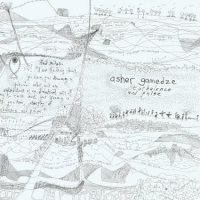Home » Jazz Articles » Album Review » Asher Gamedze: Turbulence And Pulse
Asher Gamedze: Turbulence And Pulse
Back in the 1950s, South African musicians, and audiences, looked to America, not Africa, for inspiration. The strength of this US-centric cultural pull has been well documented. For example: In 1951, the British journalist Anthony Sampson moved to South Africa, where for four years he was the editor of Drum magazine, the equivalent of Ebony in the US. In a 1955 article for Drum, Sampson noted the attraction of African American jazz for Black South African musicians and audiences, rising as it did above government-imposed divisions of tribe and ethnicity (put in place to foster the strategy of divide and rule). In the piece, Sampson, who in 1964 helped Nelson Mandela write the defiant "I am prepared to die" speech he delivered at the Rivonia Trial, quoted a Black townsman thus: "Tribal music! Tribal history! Chiefs! We don't care about chiefs! Give us jazz and film stars, man! We want Duke Ellington, Satchmo and hot dames! Yes, brother, anything American. You can cut out all this junk about kraals and folk tales and Basutos in blankets—forget it! You're just trying to keep us backward, that's what!"
A decade later, the compass swung 180-degrees and everything changed. In 1964, at South Africa's Castle Jazz Festival, shortly after the Rivonia judges sentenced Mandela, already jailed, to a further 26 years in prison, guitarist Philip Tabane's Malombo blew every other band offstage with an utterly Black South African style of jazz, one inspired by the folk music of the Venda people in the north east of the country. Against all expectations, the group took the festival's First Prize and won a recording deal with the Johannesburg-based Gallotone label. The historic albums Malombo Jazz (1966) and Malombo Jazz Makers Vol. 2 (1967), though recorded after Tabane had left the band, were the result.
In 1981, looking back on the 1964 event, the South African Star newspaper said: "All the clevers and 'moggos' from Pimville, Sophiatown, western Native Township and Alexandria, who prided themselves as heavy cats in mainstream jazz, found themselves reeling from music with a natural rhythm. The debut of Malombo had a devastating effect, and was the forerunner of a musical awakening among black musicians. It was in a sense the predecessor of the black-consciousness philosophy."
In 1982, reporter Mbulelo Vizikhunga Mzamane wrote that Malombo's breakthrough signalled "a cultural reawakening, an end to the period of mourning of the ravages of [the 1960] Sharpeville [massacre]."
Fast forward to 2023 and cue a second 180-degree compass swing. In the 2020s, South African jazz is secure enough in its own identity to once more tap directly into classic American jazz without risking self-harm. Turbulence And Pulse, which is a fair description of both Gamedze's surprise-packed but groove-centric drumming and compositional aesthetic, was recorded in Cape Town in 2021 with a quartet completed by trumpeter Robin Fassie, tenor saxophonist Buddy Wells and double bassist Thembinoski Mavimbela. All but one of the ten tunes, "Alibama," a Cape Klopse folk song, were written and arranged by Gamedze.
Aside from "Alibama," the album owes relatively little, at least directly, to Black South African music, although it certainly does so via the Black African diaspora. Either by design or happy coincidence, it resonates frequently and strongly with Charles Mingus' masterpiece Charles Mingus Present Charles Mingus (Candid, 1960). Not just because both albums were recorded by two-horn pianoless quartets, or because of the tower-of-power bass playing of Mavimbela. It has more to do with the rough-hewn, plain-speaking nature of the music and its tonal centre. And of shared political sensibilities: the Mingus album contained the definitive recorded version of "Original Faubus Fables," Mingus' evisceration of the segregationist Arkansas state governor, Orval Faubus, and Gamedze's music packs a similar vibe and punch.
Mix Mingus' turbulence with the pulse of Art Blakey and the Jazz Messengers circa 1960 and you have a pretty accurate indicator of Gamedze's album.
Track Listing
Turbulence's Pulse; Wynter Time; Locomotion; If It Rains To Pursue The Truth; Melancholia; Alibama; Can't See The Sun; Sometimes I Think Of Myself; Out Stepped Zim; Underground Formation; Melancholia (Live In Cairo); If It Rains To Pursue The Sun (Live In Cairo); Out Stepped Zim (Live In Cairo).
Personnel
Asher Gamedze
drumsRobin Fassie
trumpetBuddy Wells
saxophone, tenorThembinoski Mavimbela
bass, acousticAdditional Instrumentation
Julian Otis: vocal (8); Maurice Louca: synthesizers (11-13); Adham Zidan: bass (11-13); Alan Bishop: alto saxophone (11-13);Cherif El-Masri: guitar (11-13).
Album information
Title: Turbulence And Pulse | Year Released: 2023 | Record Label: International Anthem / Mushroom Hour
Tags
PREVIOUS / NEXT
Support All About Jazz
 All About Jazz has been a pillar of jazz since 1995, championing it as an art form and, more importantly, supporting the musicians who make it. Our enduring commitment has made "AAJ" one of the most culturally important websites of its kind, read by hundreds of thousands of fans, musicians and industry figures every month.
All About Jazz has been a pillar of jazz since 1995, championing it as an art form and, more importantly, supporting the musicians who make it. Our enduring commitment has made "AAJ" one of the most culturally important websites of its kind, read by hundreds of thousands of fans, musicians and industry figures every month.





















